Today's live took us deeper than expected, but exactly where we needed to go. We didn’t just talk about ancestral wisdom or cultural practices as abstract ideas—we sat with the grief of what has been lost through colonization, whiteness, and assimilation. This grief is not a weakness—it’s an invitation to reclaim what was taken and rebuild what was broken.
The grief toll is heavy. Families separated. Languages forgotten. Rituals buried. This loss doesn’t just belong to marginalized communities—it affects white-bodied people too. But we can’t bypass grief in the rush to “get to the solution.” If we want liberation, we have to hold space for grief and accountability at the same time.
Let’s sit with this.
Key Takeaways
Cultural Practices as a Pathway to Reconnection
Supremacy culture thrives on disconnection—cutting us off from traditions, languages, and ways of being. Cultural practices like storytelling, shared meals, ceremonies, and language revitalization are not just nostalgic—they are acts of survival and liberation.
Example: Enslaved Africans braided escape routes into hair and used coded spirituals to communicate during escape plans. Cultural practices have always been tools for resistance and survival.
Reflection: Where can you reconnect with a cultural practice in your daily life, even if it feels small or forgotten? What does it feel like to return to something you were told to leave behind?
Grieving What Was Lost in Systems of Whiteness
Grief and accountability must walk hand in hand. White-bodied people, in particular, face a dual reckoning—grieving the cultural knowledge and practices they were forced to give up for acceptance into whiteness, and acknowledging the harm done to others as a result.
Example: My Irish ancestors gave up their language and customs for survival in America, but at what cost? They gained proximity to power but lost their connection to who they were before they became “white.”
Reflection: Who were you before you were white? What does it mean to grieve that loss while committing to collective repair?
Healing Through Reclamation and Co-Creation
Healing isn’t about looking back longingly—it’s about reclaiming what serves us and co-creating something new. This is the work of liberation: blending ancestral wisdom with modern frameworks to design systems of care, interdependence, and equity.
Example: The resurgence of Indigenous foodways, Black liberation practices, and cultural revitalization movements show us that healing comes through action and co-creation.
Reflection: What traditions, wisdom, or practices could you reclaim to help co-create liberatory spaces?
Highlights from Today’s Discussion
💭The Grief Toll: I shared how grief doesn’t just belong to individuals—it’s intergenerational. “How many families were separated? How many grandkids can’t speak to their grandparents? How many have lost their languages and cultural markers?” Grieving this isn’t just a step—it’s part of the work itself.
💭 Generational Trauma Is Close: “We are not so far removed from these events,” I reminded the group. Our grandparents witnessed wars and atrocities in their lifetimes. The trauma they carried has been passed down. The behaviors we see today—silence, avoidance, assimilation—are legacies of that trauma.
💭 Who Were You Before You Were White?: This question isn’t meant to shame—it’s meant to liberate. White-bodied people were never meant to become “white.” They had cultural identities, languages, and traditions that were forced into erasure. Sitting with that question allows for honest grief and the possibility of reimagining identity.
💭 Healing in Community: Healing isn’t a solo act. We heal in relationships, through rituals, and in shared spaces. One participant shared how reconnecting with their family's storytelling tradition helped them understand their own resilience. Another described how cooking traditional meals with their child reminded them that food isn’t just nourishment—it’s ancestral knowledge.
Practice Your Praxis:
Healing requires practice, not just reflection. Let’s take action today:
✨ Reflect on the question: What was lost in my lineage due to assimilation or colonization? Write your thoughts in a journal. Don’t rush to answers—sit with the discomfort.
✨ Reconnect: Identify one cultural practice (a meal, ritual, or story) that you can reclaim or share with someone close to you.
✨ Community Healing: Reach out to a friend or family member and share something you’ve discovered about your heritage. This could be a memory, a family recipe, or a reflection. Healing isn’t meant to be done in isolation.
✨ Community Conversation: Reach out to a friend, family member, or trusted community member and have a conversation about ancestral reconnection. Share a story or memory tied to your lineage and ask them about theirs. How can you support each other’s healing journeys?
✨ Who Were You Before You Were White? White-bodied people are encouraged to sit with this question without defensiveness. What traditions did your family leave behind to “fit in,” and how has this impacted your sense of identity today?
✨ Honor the Grief: Create a small ritual to acknowledge what was lost and invite healing. Light a candle, hold an object of significance, or write a letter to your ancestors thanking them for what they preserved. Sit in stillness and reflect on the resilience that lives within you.
Survey: Substack or Zoom for Future Lives?
As we approach Day 10, I’d love your feedback on whether we should continue the lives on Substack or switch to Zoom when they move to paid subscribers.
📚 For Deeper Exploration:
Don’t forget to download my ebook: Dismantling Supremacy Culture: Understanding and Overcoming Its 15 Pillars.You’ll also receive a printable infographic. It’s Pay What You Can: Grab it here.
Looking Ahead to Day 10:
Tomorrow, we explore Liberation Begins With Listening—a skill we underestimate but can’t live without. How do we listen to hear, not respond? How do we create space for voices that often go unheard? Join me for this important conversation.
🌟 After Day 10 (February 1st), access to 100 Days of Community will be for paid subscribers. If financial barriers exist, email scholarships@desireebstephens.com for a complimentary year-long subscription.
Conclusion:
Let’s acknowledge that grief and joy coexist, especially in liberation work. While we honor the grief, we can also celebrate the resilience that our ancestors passed on.
Their resilience allowed us to be here, sharing stories and continuing their legacy. We honor them not just through mourning but through celebration—by reclaiming what they could not fully preserve and creating something new.
In solidarity and liberation,
Desireé B. Stephens CPS-P
Educator | Counselor | Community Builder
Founder, Make Shi(f)t Happen
Join me tomorrow at 9:30 am EST for my next live video in the app

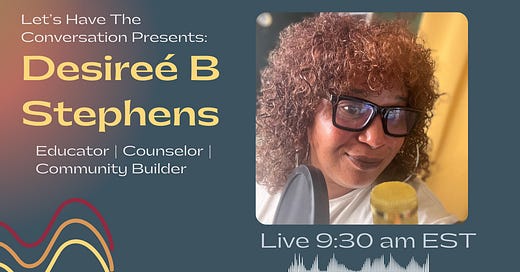


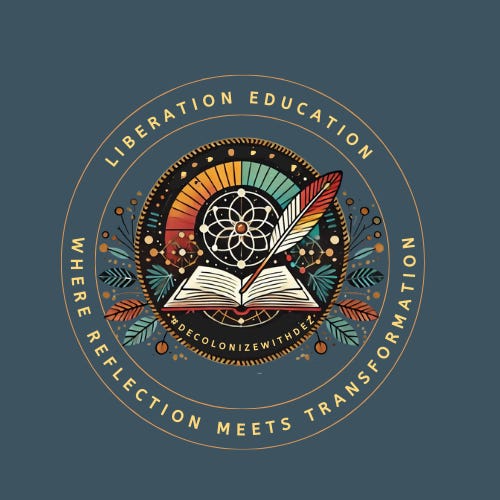

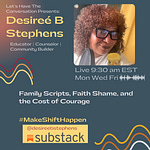


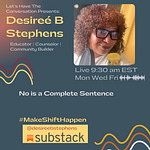

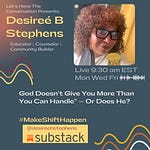
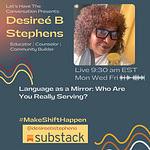
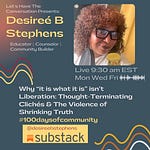
Share this post